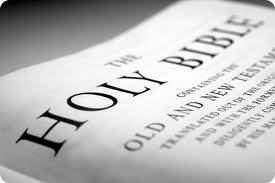From the Gospel of John:
Jesus said: “You search the scriptures because you think that in them you have eternal life; and it is they that testify on my behalf. Yet you refuse to come to me to have life. I do not accept glory from human beings. But I know that you do not have the love of God in you. I have come in my Father’s name, and you do not accept me; if another comes in his own name, you will accept him. How can you believe when you accept glory from one another and do not seek the glory that comes from the one who alone is God? Do not think that I will accuse you before the Father; your accuser is Moses, on whom you have set your hope. If you believed Moses, you would believe me, for he wrote about me. But if you do not believe what he wrote, how will you believe what I say?”
(From the Daily Office Lectionary – John 5:39-47 (NRSV) – March 1, 2013.)
 It’s called bibliolatry and it’s been around a long, long time. The dictionary definition of bibliolatry is “excessive reverence for the Bible as literally interpreted.” What I most enjoy about modern bibliolatry is that it denies that it is bibliolatry in the most circular and bibliolatrous of ways.
It’s called bibliolatry and it’s been around a long, long time. The dictionary definition of bibliolatry is “excessive reverence for the Bible as literally interpreted.” What I most enjoy about modern bibliolatry is that it denies that it is bibliolatry in the most circular and bibliolatrous of ways.
For instance, this is from a website that claims its stance on Holy Scripture is not bibliolatry because of what Scripture says about itself:
It is important to understand what the Bible says about itself. Second Timothy 3:16-17 declares, “All Scripture is God-breathed and is useful for teaching, rebuking, correcting and training in righteousness, so that the man of God may be thoroughly equipped for every good work.” So, if the Bible is “God-breathed,” and “God does not lie” (Titus 1:2), then every word in the Bible must be true. Believing in an inerrant, infallible, and authoritative Bible is not bibliolatry. Rather, it is simply believing what the Bible says about itself. Further, believing what the Bible says about itself is in fact worshipping the God who breathed out His Word. Only a perfect, infallible, omnipotent, omnipresent, and omniscient God could create written revelation that is itself perfect and infallible.
In so many words what this says is, “The Bible is inerrant and infallible because it says it is.” It doesn’t actually (that is not a valid interpretation of Second Timothy or Titus), but is anything else (other than, perhaps, the holy books of other religions) given that kind of reverence? Is any other source of information permitted that sort of self-validation without question?
The Jews of Jesus’ day did not (and to this day do not) view Scripture as inerrant, but those to whom Jesus was speaking did rely on the Torah quite heavily; they gave it, perhaps, excessive reverence. The Pharisees did search the scriptures for rules of behavior and piety because they thought that in them they would find eternal life. In this regard, I believe, the evangelical literalists resemble them with their approach to the Bible as inerrant and infallible.
At a meeting of the Evangelical Theological Society, Professor J.P. Moreland of Biola University said:
In the actual practices of the Evangelical community in North America, there is an over-commitment to Scripture in a way that is false, irrational, and harmful to the cause of Christ. And it has produced a mean-spiritedness among the over-committed that is a grotesque and often ignorant distortion of discipleship unto the Lord Jesus.
It’s that mean spiritedness that concerns me. It has spread throughout the Christian community, not simply among Evangelicals. It seems to me that we are all, to one extent or another, bibliolatrists. We may not consider the Bible inerrant and infallible, but we have our favorite bits of Scripture that we emphasize and hold in “excessive reverence” . . . and when our particular position on some issue is challenged, we can all be mean-spirited and often are. When that happens, the Scriptures are our accuser. Just as Jesus said to the Jews about the Torah, so we should think of the New Testament:
“This is my commandment, that you love one another as I have loved you.” (John 15:12 NRSV)
“Be of the same mind, having the same love, being in full accord and of one mind.” (Philippians 2:2 NRSV)
“You do well if you really fulfill the royal law according to the scripture, ‘You shall love your neighbor as yourself.'” (James 2:8 NRSV)
“Finally, all of you, have unity of spirit, sympathy, love for one another, a tender heart, and a humble mind.” (1 Peter 3:8 NRSV)
“Little children, let us love, not in word or speech, but in truth and action.” (1 John 3:18 NRSV)
“May mercy, peace, and love be yours in abundance.” (Jude 1:2 NRSV)
In our several liberal denominations, we may not take the Bible literally; we may not consider it completely authoritative in all spheres of life. I, for one, do not. The Bible is not a scientific text; it is not a history book. When poetry in the Bible says that mountains skipped like rams or hills like lambs (Ps. 114), I do not take that as a literal fact. When the creation stories of Genesis say that God created everything in six days or made humans out of mud, I do not take that as scientific fact. When the Bible says the sun stood still and the moon stopped for a day, I don’t take that to be a historical reality. (Joshua 10:13) I take these tales seriously. I believe that they reveal truth, but I do not believe they are factual. In the same way, I take John, Paul, James, Peter, and Jude seriously.
If we give into mean spiritedness, it is they who will accuse us. And we will be convicted.
====================
A request to my readers: I’m trying to build the readership of this blog and I’d very much appreciate your help in doing so. If you find something here that is of value, please share it with others. If you are on Facebook, “like” the posts on your page so others can see them. If you are following me on Twitter, please “retweet” the notices of these meditations. If you have a blog of your own, please include mine in your links (a favor I will gladly reciprocate). Many thanks!
====================
Father Funston is the rector of St. Paul’s Episcopal Church, Medina, Ohio.
 A couple of months ago, I was part of a conversation among several parishioners about the set-up for our celebrations of the Nativity. We looking at our plans for Christmas services, and a member of our altar guild exclaimed, “That’s the problem! Things are always changing around here!”
A couple of months ago, I was part of a conversation among several parishioners about the set-up for our celebrations of the Nativity. We looking at our plans for Christmas services, and a member of our altar guild exclaimed, “That’s the problem! Things are always changing around here!” Nelson Mandela, an example of justice, courage, wisdom, patience, strength, love, hope, faith, forgiveness, and reconciliation, known to his countrymen and people of grace around the world as “Madiba,” died yesterday evening at the age of 95. His death was not unexpected; he had been ailing for quite a long time. This may be St. Nicholas Day, but really there’s no choice but to consider and write about Mr. Mandela!
Nelson Mandela, an example of justice, courage, wisdom, patience, strength, love, hope, faith, forgiveness, and reconciliation, known to his countrymen and people of grace around the world as “Madiba,” died yesterday evening at the age of 95. His death was not unexpected; he had been ailing for quite a long time. This may be St. Nicholas Day, but really there’s no choice but to consider and write about Mr. Mandela! It’s called bibliolatry and it’s been around a long, long time. The dictionary definition of bibliolatry is “excessive reverence for the Bible as literally interpreted.” What I most enjoy about modern bibliolatry is that it denies that it is bibliolatry in the most circular and bibliolatrous of ways.
It’s called bibliolatry and it’s been around a long, long time. The dictionary definition of bibliolatry is “excessive reverence for the Bible as literally interpreted.” What I most enjoy about modern bibliolatry is that it denies that it is bibliolatry in the most circular and bibliolatrous of ways.  Sort of buried in Jude’s moralizing about false teachers and those who follow them is an Advent message: “Look forward to the mercy of our Lord Jesus Christ that leads to eternal life.” As I’ve been saying pretty consistently throughout the season, here and in my sermons, Advent is not so much about celebrating the birth of Jesus, wherever it was and whenever it was about 2,000 years ago, as it is about getting ready for his return, the parousia as seminary-educated folks like to say.
Sort of buried in Jude’s moralizing about false teachers and those who follow them is an Advent message: “Look forward to the mercy of our Lord Jesus Christ that leads to eternal life.” As I’ve been saying pretty consistently throughout the season, here and in my sermons, Advent is not so much about celebrating the birth of Jesus, wherever it was and whenever it was about 2,000 years ago, as it is about getting ready for his return, the parousia as seminary-educated folks like to say.

